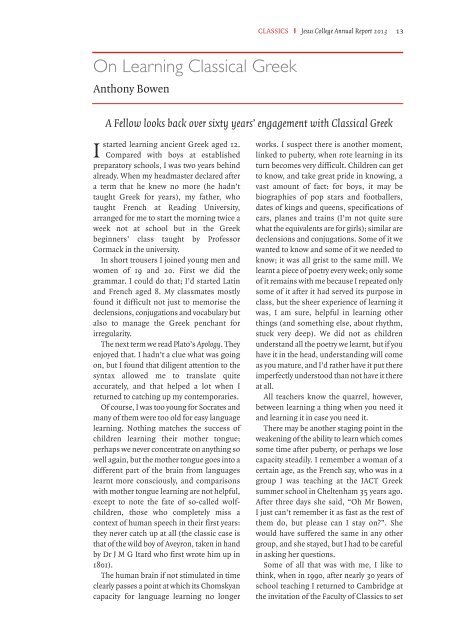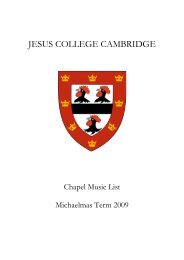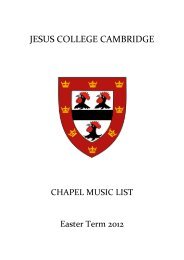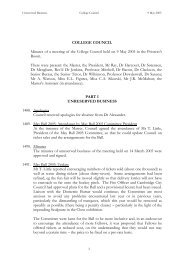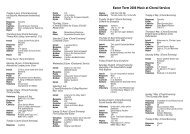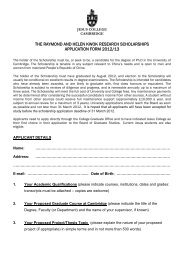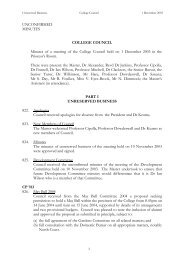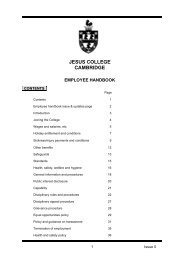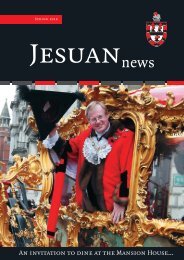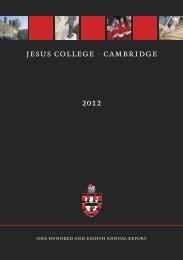2013 Annual Report - Jesus College - University of Cambridge
2013 Annual Report - Jesus College - University of Cambridge
2013 Annual Report - Jesus College - University of Cambridge
Create successful ePaper yourself
Turn your PDF publications into a flip-book with our unique Google optimized e-Paper software.
CLASSICS I <strong>Jesus</strong> <strong>College</strong> <strong>Annual</strong> <strong>Report</strong> <strong>2013</strong> 13<br />
On Learning Classical Greek<br />
Anthony Bowen<br />
A Fellow looks back over sixty years’ engagement with Classical Greek<br />
I<br />
started learning ancient Greek aged 12.<br />
Compared with boys at established<br />
preparatory schools, I was two years behind<br />
already. When my headmaster declared after<br />
a term that he knew no more (he hadn’t<br />
taught Greek for years), my father, who<br />
taught French at Reading <strong>University</strong>,<br />
arranged for me to start the morning twice a<br />
week not at school but in the Greek<br />
beginners’ class taught by Pr<strong>of</strong>essor<br />
Cormack in the university.<br />
In short trousers I joined young men and<br />
women <strong>of</strong> 19 and 20. First we did the<br />
grammar. I could do that; I’d started Latin<br />
and French aged 8. My classmates mostly<br />
found it difficult not just to memorise the<br />
declensions, conjugations and vocabulary but<br />
also to manage the Greek penchant for<br />
irregularity.<br />
The next term we read Plato’s Apology. They<br />
enjoyed that. I hadn’t a clue what was going<br />
on, but I found that diligent attention to the<br />
syntax allowed me to translate quite<br />
accurately, and that helped a lot when I<br />
returned to catching up my contemporaries.<br />
Of course, I was too young for Socrates and<br />
many <strong>of</strong> them were too old for easy language<br />
learning. Nothing matches the success <strong>of</strong><br />
children learning their mother tongue;<br />
perhaps we never concentrate on anything so<br />
well again, but the mother tongue goes into a<br />
different part <strong>of</strong> the brain from languages<br />
learnt more consciously, and comparisons<br />
with mother tongue learning are not helpful,<br />
except to note the fate <strong>of</strong> so-called wolfchildren,<br />
those who completely miss a<br />
context <strong>of</strong> human speech in their first years:<br />
they never catch up at all (the classic case is<br />
that <strong>of</strong> the wild boy <strong>of</strong> Aveyron, taken in hand<br />
by Dr J M G Itard who first wrote him up in<br />
1801).<br />
The human brain if not stimulated in time<br />
clearly passes a point at which its Chomskyan<br />
capacity for language learning no longer<br />
works. I suspect there is another moment,<br />
linked to puberty, when rote learning in its<br />
turn becomes very difficult. Children can get<br />
to know, and take great pride in knowing, a<br />
vast amount <strong>of</strong> fact: for boys, it may be<br />
biographies <strong>of</strong> pop stars and footballers,<br />
dates <strong>of</strong> kings and queens, specifications <strong>of</strong><br />
cars, planes and trains (I’m not quite sure<br />
what the equivalents are for girls); similar are<br />
declensions and conjugations. Some <strong>of</strong> it we<br />
wanted to know and some <strong>of</strong> it we needed to<br />
know; it was all grist to the same mill. We<br />
learnt a piece <strong>of</strong> poetry every week; only some<br />
<strong>of</strong> it remains with me because I repeated only<br />
some <strong>of</strong> it after it had served its purpose in<br />
class, but the sheer experience <strong>of</strong> learning it<br />
was, I am sure, helpful in learning other<br />
things (and something else, about rhythm,<br />
stuck very deep). We did not as children<br />
understand all the poetry we learnt, but if you<br />
have it in the head, understanding will come<br />
as you mature, and I’d rather have it put there<br />
imperfectly understood than not have it there<br />
at all.<br />
All teachers know the quarrel, however,<br />
between learning a thing when you need it<br />
and learning it in case you need it.<br />
There may be another staging point in the<br />
weakening <strong>of</strong> the ability to learn which comes<br />
some time after puberty, or perhaps we lose<br />
capacity steadily. I remember a woman <strong>of</strong> a<br />
certain age, as the French say, who was in a<br />
group I was teaching at the JACT Greek<br />
summer school in Cheltenham 35 years ago.<br />
After three days she said, “Oh Mr Bowen,<br />
I just can’t remember it as fast as the rest <strong>of</strong><br />
them do, but please can I stay on?”. She<br />
would have suffered the same in any other<br />
group, and she stayed, but I had to be careful<br />
in asking her questions.<br />
Some <strong>of</strong> all that was with me, I like to<br />
think, when in 1990, after nearly 30 years <strong>of</strong><br />
school teaching I returned to <strong>Cambridge</strong> at<br />
the invitation <strong>of</strong> the Faculty <strong>of</strong> Classics to set


